


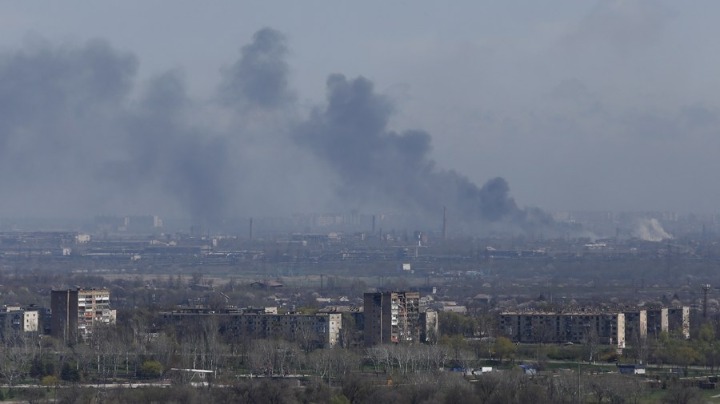
Russia's President Vladimir Putin says his country will continue its yearlong "special military operation" in Ukraine, and he accused the US-led NATO alliance of fanning the flames.
Russia-Ukraine conflict would have cost world economy $1.6 trillion in 2022, according to a study published by the German Economic Institute.

KYIV - US President Joe Biden made an unannounced visit here on Monday, one day after demonstrators rallied in Washington to protest against the United States' war-mongering foreign policy and its role in various conflicts across the globe.
Biden held talks with his Ukrainian counterpart, Volodymyr Zelensky, about the situation on the frontline in Ukraine and announced an additional $500 million in military aid for Ukraine on top of the more than $50 billion already promised, a move that is widely believed to further escalate the Ukraine crisis.
While speaking at a joint press conference with Zelensky, Biden said the new assistance package will consist of missiles for High Mobility Artillery Rocket Systems (HIMARS) and Javelin anti-tank missile systems, as well as more military equipment and weapons.
The United States and its allies have already committed nearly 700 tanks and thousands of armored vehicles and 1,000 artillery systems, among other aid to Ukraine, Biden said.
For his part, Zelensky said the war must end with the full de-occupation of Ukrainian territories and security guarantees for Ukraine.
Biden's trip, which came four days ahead of the first anniversary of the outbreak of the Russia-Ukraine conflict, is designed to show solidarity with Ukraine.
The brief visit also came at a time when more people in the United States and beyond are growing wary of the US role in the year-long conflict.
Hundreds of protesters on Sunday afternoon slammed the United States' role of "war machine" in overseas wars at a rally before the Lincoln Memorial in Washington, DC.
Organizers said the anti-war rally was planned to protest against massive money being funneled into Ukraine, as well as the United States' role in the Russia-Ukraine military conflict.
"Billions of taxpayers' dollars are being torched at the altar of US hegemony, the military-industrial complex, and a corrupt Congress," a release read.
The protesters then marched to the White House after the rally, chanting slogans like "No NATO, no war."
Public distrust of US authorities has also been fueled by a hazmat train derailment in a Ohio village on Feb 3 and a deadly Texas train derailment on Feb 13.
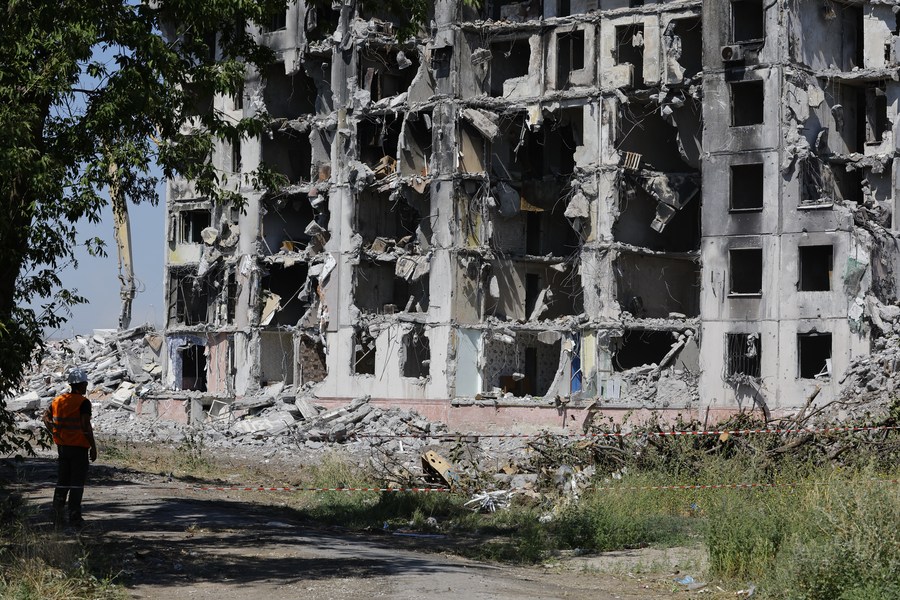
How different is the Russian-Ukrainian war as seen by those in Bakhmut, where Ukrainian and Russian forces are fighting, from the view of those in the conference room of the NATO air base in Ramstein, Germany, where representatives of 54 countries are trying to agree on more military aid for Ukraine.
The fighting will continue as both belligerents stubbornly take mutually exclusive positions, expecting the negotiations to exclusively meet their terms, which are unacceptable to the other party. But eventually peace talks must take place, because the fighting will not be decisive either on the frozen front of Bakhmut, or on other front lines drawn by strategists and politicians in Kyiv, Moscow, or some other capitals. A cease-fire must be agreed to, and peace negotiations must be held. Yet, according to those promoting continued fighting, these will only happen when one side or the other is greatly exhausted, if not on its knees. So far, each side believes that by continuing the hostilities, its negotiating position will be more favorable.
The situation is further complicated because the conflict continues to escalate. It has become an international conflict on an ever-increasing scale, involving about 60 countries, most of which are supporting Ukraine. Without economic and financial aid, Ukraine would already be a failed state; in 2023, more than half of the Ukrainian budget is foreign-funded.
Although it does not directly participate in combat with troops under its command — rightly so, because it could quickly turn Cold War II into World War III — NATO has been flexing its muscles. Russian President Vladimir Putin's "special military operation" would soon have ended in a victory for Russia, if not for the huge military aid provided by the West, which has cost it over $100 billion in the first year of the war. So far, despite unanimous political declarations made in 2009, the rich West has not been able to allocate such an amount to help poor countries in their fight against climate warming, the true global public enemy No 1.
The recent meeting in Ramstein of 30 NATO members and delegates from another 24 countries, including Japan and Australia, again shows that although there is general and firm support for Ukraine, the positions of individual states vary, with a conflict between ideals and interests. The idea of fighting for "a just" cause (especially when it is far from one's borders) reconciles the whole group easier than the practicalities of specific monetary and in-kind support. The conflicting interests of NATO members and their influential military-industrial lobbies collide.
While it is expensive for countries to send military equipment, it is a lucrative business for their armaments companies. No wonder, therefore, that as many as five brands of howitzers — the US M777, British AS90 Braveheart, German PzH 2000, French CAESAR and Polish AHS Krab — that require different ammunition and partially different logistics, have been sent to Ukraine at the expense of taxpayers. There have been disputes concerning the supply of tanks: US Abrams, British Challengers, German Leopards and French Leclercs. At the NATO level, coordination in this matter is failing, and in Kyiv, harsh words of discontent are heard: "Every day of delay is the death of Ukrainians", President Volodymyr Zelensky's adviser has said, appealing for more weapons. For Ukraine, these deliveries — their timing and quantity — are seen as essential; for arms manufacturers, it is an opportunity to showcase their armaments, so why should they want to shorten the duration of the conflict? That would reduce their profits.
But supplying military equipment is straining the budgets of the countries that are doing so. Years of spending exceeding revenues have led to a United States public debt of 121 percent of GDP.The situation is hardly better in other Western countries, and in some, such as Italy, Greece or Japan, it is much worse. The cost of servicing this debt is rising even more in the wake of anti-inflationary interest rate hikes. The time of great fiscal challenge has arrived. Public expenditures related to the functioning of pension systems inevitably increase due to deteriorating relations between people of working and post-working age. Healthcare spending in aging societies and state expenses toward net-zero greenhouse gas emissions are also growing.
The possibilities of cutting other public expenditures are slight, so it will be necessary to raise taxes. This is not because a group of billionaires and millionaires have called for it, sending a spectacular yet practically insignificant letter to the participants of the Davos Economic Forum, but because state coffers demand it if we want to avoid another serious financial crisis. So far, we are on the road toward one.
Politicians do not present the matter honestly. While declaring that aid for Ukraine is costly and that it is necessary to increase defense expenditures, they do not say that it has to be paid for either by lowering the level of some public services, such as healthcare or education, or by increasing taxes. Reality will force them to say it, in different countries at different times, depending on the phase of political cycles and public mood.
On average in the Organization for Economic Cooperation and Development countries, the ratio of taxes to GDP is 36.3 percent. In the US, it is 10 percentage points less, only 26.6 percent, so it should be easier to raise taxes. In France, where this ratio is almost 10 percentage points above the average, 45.7 percent, it will be very tough. In Poland, the political class imposed a statutory obligation to allocate at least 3 percent of GDP annually to defense, without indicating where this additional 1 percent over the level of 2 percent of GDP suggested by NATO should come from, and recently the prime minister announced an increase in military spending in 2023 to as much as 4 percent of GDP.
The sooner there is a cease-fire in Ukraine and peace negotiations begin the better. Concerted international efforts are needed to this effect. It is a time for diplomacy and statesmen, not an arms race and zero-sum politicians.
The author is a professor at Kozminski University in Warsaw, distinguished professor of the Belt and Road School at Beijing Normal University and a former Polish deputy prime minister and minister of finance. His new book, Global Consequences of Russia's Invasion of Ukraine: The Economics and Politics of the Second Cold War, will be published in March.
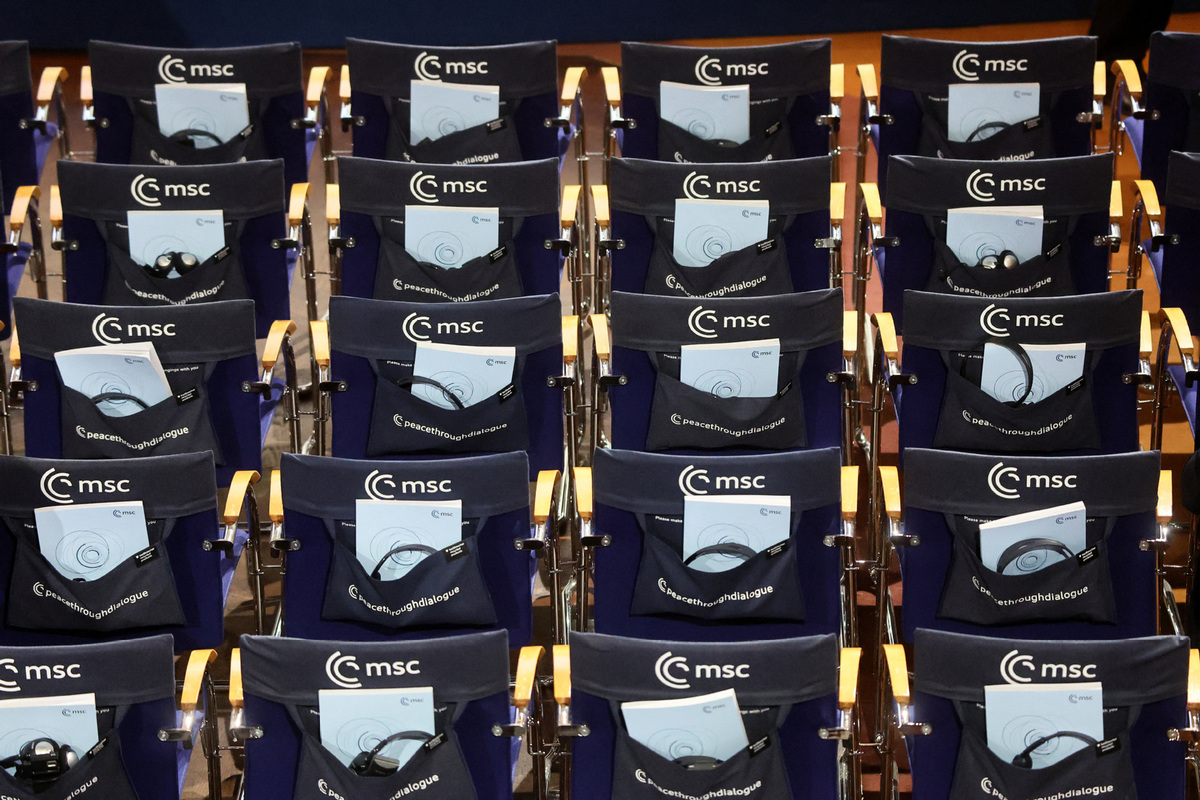
Western leaders at the 59th Munich Security Conference in Germany have pledged to ramp up political and military support for Kyiv while those from the Global South have urged diplomacy to solve the Russia-Ukraine conflict.
The annual meeting, held from Friday to Sunday, focused on the yearlong conflict, with most representatives coming from NATO members and some leaders from the Global South.
German Chancellor Olaf Scholz told the conference that Germany will soon be able to deploy its first Leopard tanks in Ukraine.
It was "wise to prepare for a long war" and to show Russian President Vladimir Putin that Germany and its allies would not give up on Ukraine, he said.
French President Emmanuel Macron said Europe had to be ready for a prolonged conflict. The hour of dialogue had not yet arrived, he said.
European Commission President Ursula von der Leyen called on countries to "speed up and scale up" production of the standardized products desperately needed in Ukraine. "For example, standardized ammunition," she said. "We cannot wait months and years until we are able to replenish (stocks) and until we are able to deliver that to Ukraine."
British Prime Minister Rishi Sunak called on world leaders to send the most advanced weapons. Now was the time to "double down" on military support, he said.
Kamala Harris, the United States vice-president, quoted President Joe Biden as saying that the US "will support Ukraine for as long as it takes. We will not waver".
Brazilian Foreign Minister Mauro Vieira said his country stands by its decision not to supply tank ammunition to Ukraine but is ready to help broker an end to the conflict.
"We have to try to make a solution possible," Vieira said. "We cannot limit ourselves to talking about the war. I am not referring to immediate negotiations. We would have to go step by step, perhaps first create an environment that makes a negotiation possible."
Saara Kuugongelwa, the prime minister of Namibia, cited national reconciliation in her country and other African states as examples of seeking a peaceful solution. "We want to solve the problem. We don't want to find the culprit," she said.
The Munich Security Report 2023 noted a global divide on the conflict. While most of the world, measured according to GDP, has condemned Russia's actions, countries that are neutral or Russia-leaning are home to most of the global population.
Paul Rogers, emeritus professor of peace studies at Bradford University in the United Kingdom, said one thing that is missing in the Western mainstream media's coverage of the conflict is the sense of attitudes across the Global South.
"While it may seem to be a straightforward 'good guys versus bad guys' scenario, even a cursory look shows a very different interpretation in much of the world. There simply isn't the universal support for the West and opposition to Russia that many Westerners assume," he wrote in an article posted on open-democracy.net.
Bloc should focus on peace-building in Ukraine, Hungary Foreign Minister says
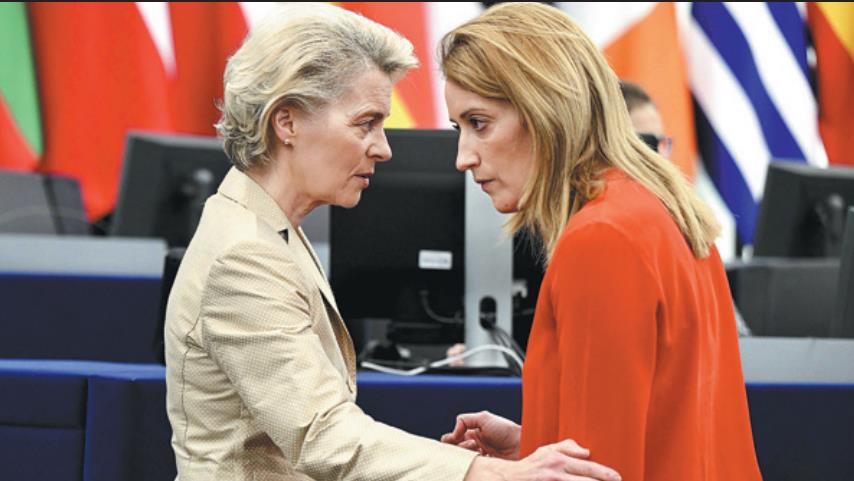
The European Commission proposed its 10th round of sanctions against Russia on Wednesday as NATO pledged to ramp up its military aid to Ukraine in the nearly one-year-long Russia-Ukraine conflict.
For the first time the new sanctions target third countries, with seven Iranian entities to be punished for allegedly supplying armed drones to Russia.
European Commission President Ursula von der Leyen accused Iran's Revolutionary Guard of providing Shahed drones to attack civilian infrastructure in Ukraine.
"And we stand ready to list further Iranian and other third-country entities that are providing sensitive technology to Russia."
The new sanctions will include further export bans worth more than 11 billion euros ($11.78 billion) to "deprive the Russian economy of critical technology and industrial goods" such as electronics and specialized vehicles.
The commission also proposed further restricting the export of dual-use goods and advanced technology goods, such as controls on 47 new electronic components that von der Leyen said can be used in Russian weapons systems.
"With this we have banned all tech products found on the battlefield. And we will make sure they don't find other ways to get there."
Ben Norton, editor-in-chief of the news outlet the Geopolitical Economy Report, said: "Soon every country in the Global South that refuses to follow orders will be sanctioned by the West."
The new round of proposed sanctions also includes the so-called Russian propaganda machine.
"We are imposing restrictive measures on media organizations, on persons and organizations who are polluting the public space with disinformation and malicious narratives, adding to the military warfare also through information warfare," the European Union foreign policy chief Josep Borrell said.
The European Commission hopes all 27 member states will endorse the latest round of sanctions before the one-year anniversary of start of the Russia-Ukraine conflict on Feb 24.
Hungary is reportedly unenthusiastic about arms supplies to Ukraine and new sanctions against Russia.
"Instead of dead-end and hundreds of millions of euros in arms shipments, the EU should focus on peace-building in Ukraine," the online newsletter Hungary Today quoted the country's Foreign Minister, Peter Szijjarto, as saying.
The proposed new sanctions were announced on the same day as NATO defense ministers ended a two-day meeting in Brussels to ramp up military support for Ukraine in a conflict that is increasingly seen as a proxy war between NATO and Russia.
The NATO Secretary-General Jens Stoltenberg urged allies to sustain support and assistance for Ukraine.
Munitions stocks
Speaking about concerns that the enormous amount of ammunition being sent to Ukraine was depleting NATO members' munitions stocks, Stoltenberg said key allies such as the United States, France, Germany and Norway had signed defense contracts to ramp up production.
He urged NATO's 30 members to commit at least 2 percent of GDP to military spending.
"There is a full-fledged war going on in Ukraine, in Europe, and then we see the persistent threat of terrorism, and we see also the challenges that China is posing to our security. So it is obvious that we need to spend more.
"Instead of changing the 2 percent, I think we should move from regarding the 2 percent as a ceiling toward the 2 percent of GDP as a floor and minimum."
In the US, military sending accounts for 3.5 percent of GDP, more than that of the next 10 countries combined.
"What has NATO ever done for peace?" Mick Wallace, an MEP from Ireland, said on Wednesday. "Absolutely nothing. It doesn't interest them; there's no money in it."
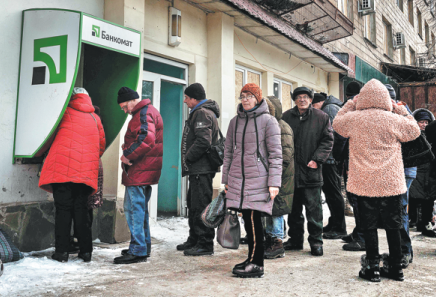
Ukraine's top general and the top US Army commander discussed further military aid for Kyiv on Monday in Europe, as allies began training Ukrainian troops on the Leopard 2 and other modern battle tanks that are to boost the country's defense.
Valeriy Zaluzhnyi, commander in chief of Ukraine's armed forces, spoke to United States General Christopher Cavoli, commander in chief of Europe's combined NATO forces, before the US-led meeting of defense heads from several NATO countries on Tuesday.
"We discussed the issue of supplying international military aid to Ukraine and training our units on the territory of partner countries," Zaluzhnyi was quoted by Ukraine's defense ministry as saying.
Tuesday's meeting follows a conference last month at Ramstein Air Base in Germany that was key to decisions to send Kyiv scores of modern battle tanks, including the US M1 Abrams, German Leopard 2 and British Challenger 2.
Germany started training Ukrainian soldiers on the Leopard 2 tanks on Monday at an army base in the northern town of Munster, where Ukrainian troops are already exercising on Marder infantry fighting vehicles that will also be handed over to Kyiv.
The move came on the same day that Polish President Andrzej Duda watched a Leopard 2 training demonstration at a military base in Swietoszow, southwestern Poland, where Ukrainian troops are being trained by Polish, Canadian and Norwegian instructors.
According to The New York Times, Ukraine's leaders and their NATO backers expected the German-made tanks to be a crucial part of a campaign to push Russian forces out of the cities and towns where fighting has been centered in recent weeks.
The Kremlin has not issued a response regarding the Leopard 2 tank training, but a senior Russian diplomat said Washington is not really going to deliver Abrams tanks to Kyiv, and they are unlikely to appear in Ukraine.
"The Americans skillfully sucked Germany into this adventure by promising to deliver the Abrams and now they are basically forcing the Germans to deliver the tanks. And they are not really going to supply their Abrams and, I think, we are unlikely to ever see them in Ukraine," Konstantin Gavrilov, head of the Russian delegation to the Vienna talks on military security and arms control, told Rossiya-24 TV on Monday.
Fresh attacks
On the battlefield, the city of Bakhmut was facing heavy artillery fire as the NATO chief backed reports from Ukrainian officials in the area that Russia had launched a major new offensive, days before the first anniversary of the conflict.
Ukrainian militants in the eastern city, who have held out for months, were defending new ground attacks under heavy shelling, Ukrainian military officials said.
Positions in Bakhmut have been fortified and only people with a military role were being allowed in, a deputy battalion commander said on Monday.
NATO Secretary-General Jens Stoltenberg reaffirmed on Tuesday that NATO had to ensure Ukraine got the weapons it needed to win this battle.
Agencies contributed to this story.
renqi@chinadaily.com.cn
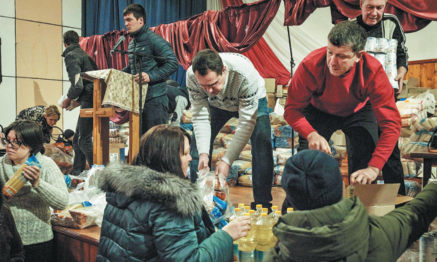
British arms and military vehicles could be manufactured in Ukraine under license, easing the country's dependence on supplies of arms from Western allies, The Telegraph reported on Sunday.
The Telegraph said British defense industry executives had traveled to Kyiv to discuss plans to set up joint ventures to manufacture weapons and vehicles locally.
Manufacturers from other European countries were also in discussions with Ukraine, it said, citing one executive saying there was a race to put Britain "at the front of the queue".
The Telegraph also reported that any joint venture between a defense manufacturer and Ukraine would probably need British government approval, and such a move would further antagonize Moscow. The media office of Prime Minister Rishi Sunak declined to comment on the report.
The news came as Ukrainian President Volodymyr Zelensky traveled to London and Paris last week to appeal for more Western arms.
Sunak told him that "nothing is off the table" when it comes to supplying Ukraine with jets to fight Russia, after announcing a plan to start training Ukrainian pilots to fly NATO-standard fighter jets.
Western countries, however, have so far stopped short of providing jets or weapons that can strike deep inside Russia.
Any move from Ukraine's allies to send fighter jets to Ukraine would have to be a "joint decision", Polish President Andrzej Duda told the BBC in an interview on Saturday.
"A decision today to donate any kind of jets, any F-16s, to donate them outside Poland is a very serious decision. And it's not an easy one for us to take," Duda said, explaining that Poland has a very limited number of jets.
Warning of consequences
The Russian state news agency TASS cited Russia's embassy in London warning that any delivery of British fighter jets to Ukraine would have serious military and political ramifications.
On the battlefield over the weekend, Russian forces maintained a high tempo of rocket attacks across the front lines of the eastern Donetsk region.
Moscow's troops carried out 23 attacks using rocket launchers over the course of 24 hours into Sunday evening, the General Staff of the Ukrainian Armed Forces said.
Russian President Vladimir Putin has "highly praised the fighting efforts by marines during the special military operation", as seen on the Moscow. Kremlin. Putin television program.
Separately, the United States embassy in Moscow has urged its citizens to leave Russia "immediately" due to a slew of security risks that include possible forced enlistment into the Russian army.
"US citizens residing or traveling in Russia should depart immediately," the embassy said on Sunday.
The embassy also warned that US citizens are at risk of harassment and singling out for detention by Russian law enforcement.
The Russian Foreign Ministry has yet to respond to the travel advisory.
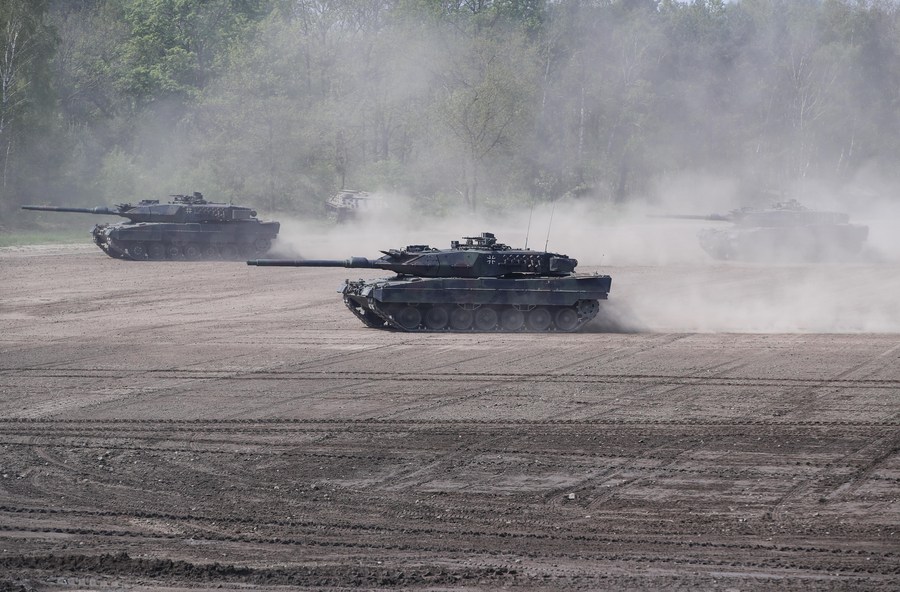
BRUSSELS -- The North Atlantic Treaty Organization (NATO) needs to "ramp up production" of ammunition as Ukraine's rate of usage is depleting current capacities and draining stockpiles, the alliance's Secretary General Jens Stoltenberg said on Monday.
The conflict in Ukraine "is consuming an enormous amount of ammunition and depleting allied stockpiles," he told journalists ahead of a meeting of the NATO member states' defense ministers.
"The current rate of Ukraine's ammunition expenditure is many times higher than our current rate of production. This puts our defense industries under strain," he said.
Stoltenberg said the current waiting time for large-caliber ammunition has increased from 12 months to 28 months.
"Orders placed today will only be delivered two and a half years later. So, we need to ramp up production and invest in our production capacity," he said.
On Tuesday, the ministers will discuss Ukraine's request for more weapons.
Ukraine's Defense Minister Oleksii Reznikov will join them both for the United States-led Contact Group for Ukraine and for the NATO ministerial session.
Stoltenberg said the alliance has decided to establish a new coordination cell at NATO Headquarters to support its efforts to prevent and counter threats to critical infrastructure, including undersea cables and pipelines.
The U.S. Navy has been accused in press reports of involvement in last September's attacks on the Nord Stream gas pipelines in the Swedish and Danish exclusive economic zones under the Baltic Sea, which were built to transport natural gas from Russia to Germany.
U.S. investigative journalist Seymour Hersh alleged in recent days that U.S. Navy divers detonated explosives under the pipelines during the Baltic Operations 2022 NATO maritime exercise.
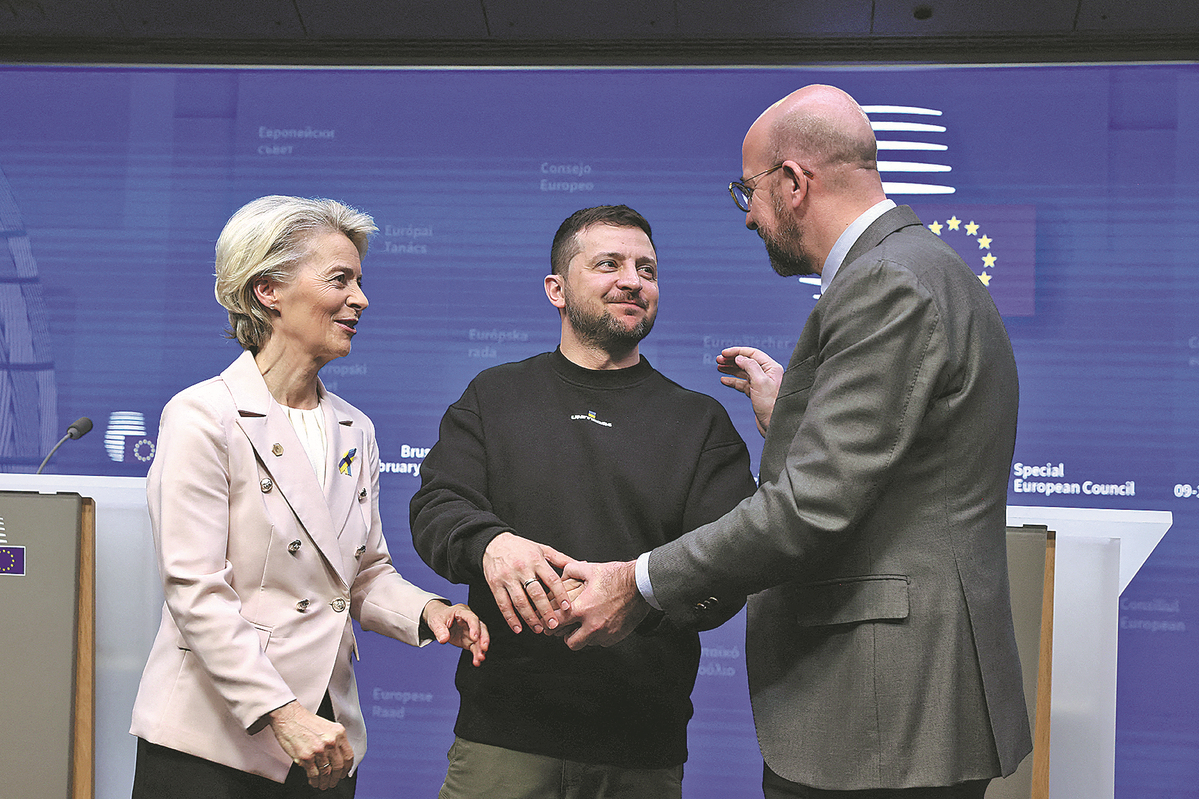
BRUSSELS — Hailed as a European hero on his arrival in Brussels, Ukrainian President Volodymyr Zelensky urged the European Union's leaders to accelerate the promised delivery of modern longrange weapons.
The Ukrainian leader said during an EU summit on Thursday that he could not return empty-handed from what was only his second foreign trip since the conflict with Russia started just under a year ago.
After Wednesday's visits to London and Paris to lobby the United Kingdom, France and Germany for modern fighter jets and long-range missiles, Zelensky flew on to Brussels to address EU leaders and the European Parliament.
He told MEPs that Ukraine needs artillery, munitions, modern tanks, long-range missiles and fighter jets faster than Russia can prepare, in what he said would be a new offensive.
European Council President and summit host Charles Michel insisted that the summit had allowed EU leaders to "make it clear that they are ready to provide more military support".
But some EU leaders were warier, fearing it could drag the West closer to direct conflict with Russia.
"There are many sensitive issues to be discussed, the pros and cons," Dutch Prime Minister Mark Rutte said.
French President Emmanuel Macron said on Friday that even if fighter jets were to be sent to Kyiv, it would not be in "the coming weeks".
Polish Prime Minister Mateusz Morawiecki said his country "will not be the first to hand over fighters", but would welcome others leading the way.
The Kremlin reacted with a grim warning.
"We see this as a growing engagement of Germany, the UK, France in the conflict between Russia and Ukraine. The boundary between indirect and direct engagement is gradually disappearing. We can only regret it," spokesman Dmitry Peskov said.
He added that could "lead to an escalation of tensions" and would not change Russia's military objectives.
NATO and the EU along with the United States have been the main backers of Ukraine during the conflict. European Commission President Ursula von der Leyen pledged a new round of sanctions to punish Russian "propagandists" and cut another 10 billion euros ($10.7 billion) worth of Moscow's exports.
Agencies via Xinhua
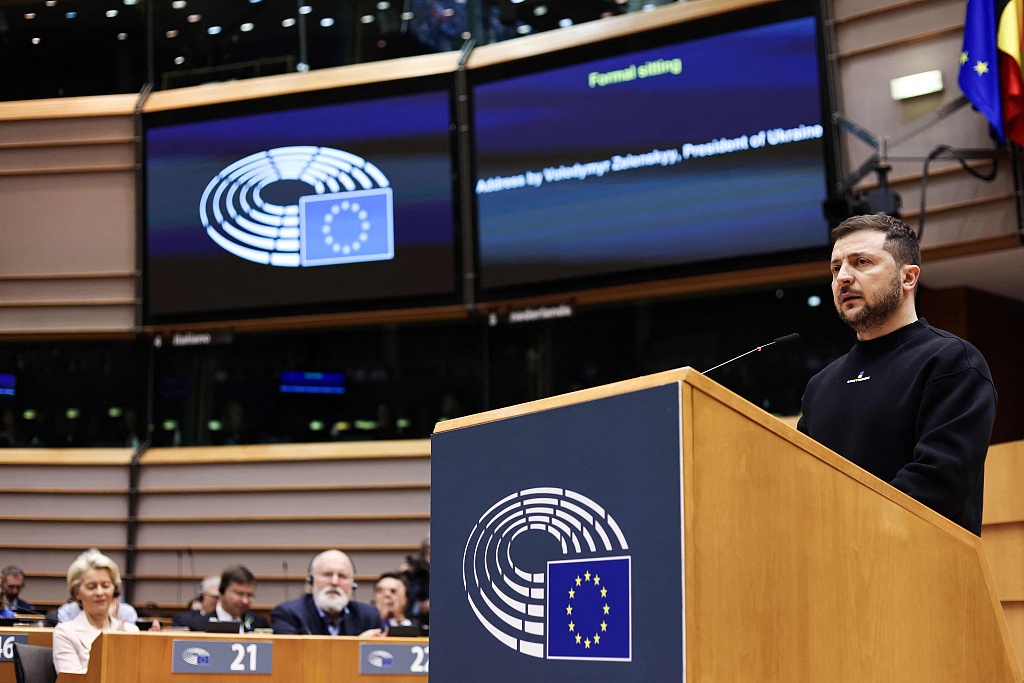
Ukrainian President Volodymyr Zelensky pleaded with European Union leaders on Thursday to grant his country faster accession to join the bloc, while thanking Europeans for their support in the past year of the Russia-Ukraine conflict.
In his first in-person address to the European Parliament in Brussels on Thursday morning, Zelensky said Ukraine is fighting to preserve the "European way of life".
"This is our Europe, these are our rules, this is our way of life. And for Ukraine, it is a way home, a way home," he told the MEPs who greeted him with a standing ovation when he entered the parliament hall.
"Ukraine is going to be a member of the EU," Zelensky said. However, the 27 EU member states are still sharply divided on the issue.
In her opening speech before Zelensky's address, European Parliament President Roberta Metsola called on EU leaders to ensure Ukraine receives "the fastest possible accession process" along with funds and help for reconstruction, training for Ukrainian troops and more military equipment, including "long-range systems and the jets" it needs to win the conflict.
"Our response must be proportional to the threat, and the threat is existential," she said. "We will be with you for as long as it takes."
Zelensky also attended the EU summit in the afternoon. He was also expected to meet NATO Secretary-General Jens Stoltenberg.
European Council President Charles Michel said it is very important to increase efforts to support Ukraine with military means on one hand and political support on the other hand. "We are extremely united, more than ever," he said on Thursday morning.
Macron's support
French President Emmanuel Macron, who arrived in Brussels along with Zelensky on Thursday, told the press that his first message was to give full support to Ukraine from day one to the last minute.
"My second message was to reiterate that Russia cannot and will not win this war," he said.
Macron said the third message was about a strategy to assess precisely the objective on the ground, the requirements and needs from an operational point of view, and the strategy to negotiate toward peace.
Macron would not comment on whether the EU will provide fighter jets to Ukraine as Zelensky has asked.
Observers believe that Zelensky is unlikely to walk away this time with much more than EU leaders renewing their pledges of unwavering support.
The EU has rolled out nine rounds of sanctions against Russia and the 10th round is expected to be announced around the first anniversary of the Russia-Ukraine conflict on Feb 24.
German Chancellor Olaf Scholz on Thursday defended his country's track record in helping Ukraine.
"Among the EU states, we are now the country that provides the most support — financial, humanitarian, but also the most concrete support in terms of arms deliveries," he said.
Brussels is the third stop in Zelensky's two-day tour through European capitals, which also took him to London and Paris.
The Russian embassy in London described Zelensky's trip to the United Kingdom as a "hasty event", "theatrical performance", "fundraising event" and the "ex-comedian in a green sweatshirt now on tour around Europe".
In response to the UK saying it is "actively looking" at whether to send fighter jets to Ukraine, the embassy warned that such a move would have "military and political ramifications" for the whole world.
Ren Qi in Moscow contributed to this story.
chenweihua@chinadaily.com.cn
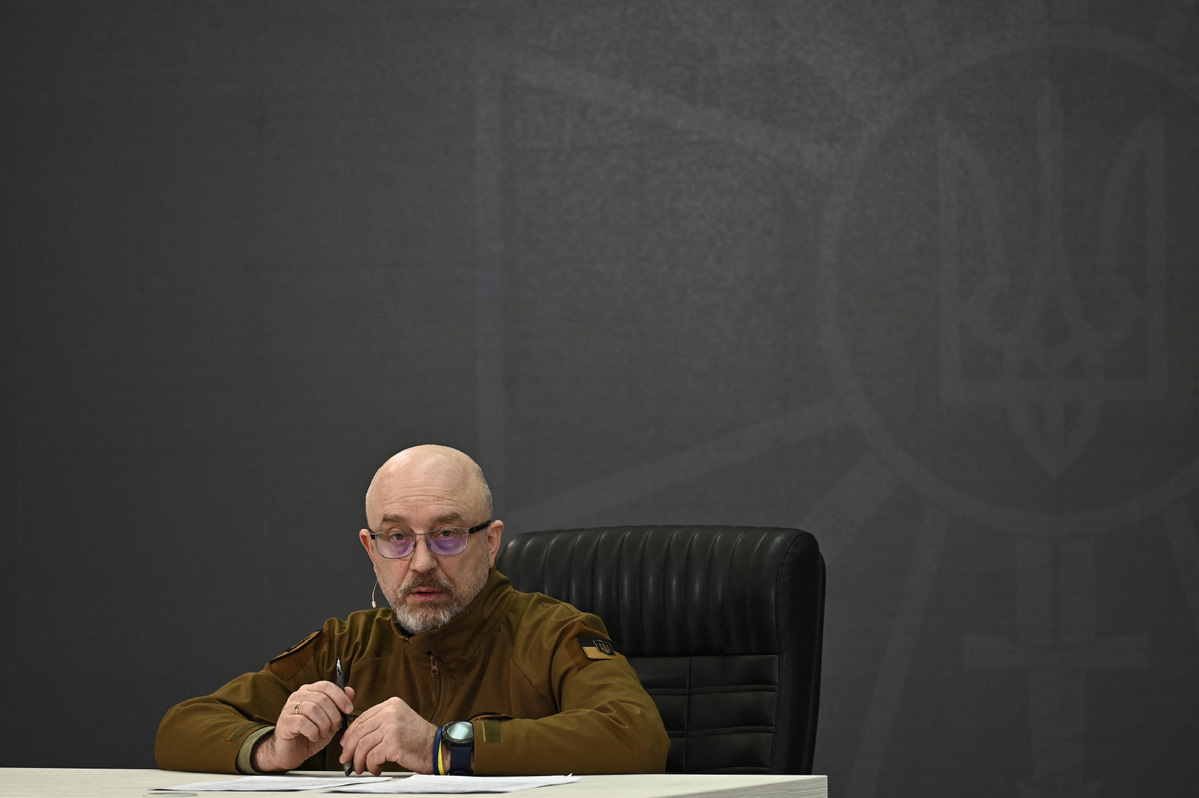
Ukrainian President Volodymyr Zelensky's party said on Sunday that it would move to replace its defense minister, as Russian forces close in on Bakhmut amid heavy fighting.
The fate of the minister, Oleksii Reznikov, has been the subject of increasing speculation amid a growing scandal about financial impropriety within the ministry and an accompanying government investigation into corruption.
David Arakhamia, chief of Zelensky's Servant of the People parliamentary bloc, said on Sunday that the Defense Ministry would be headed by Kyrylo Budanov, head of Ukraine's military intelligence.
Reznikov, he said, would become minister of strategic industries, tasked with strengthening military-industrial cooperation, after a day of speculation about the defense minister's future in Kyiv.
Reznikov has not been directly implicated in any wrongdoing, and Arakhamia did not link the move to concerns about the corruption scandal. Still, Reznikov would become the highest ranking official in Zelensky's cabinet to be reassigned in the nearly 12 months since Russia's special military operation began.
There was no immediate comment from Zelensky. Earlier on Sunday, Reznikov addressed reports that he might be replaced by saying that only one person, Zelensky, could decide if he stayed.
In an interview aired by Ukrainian television channel ICTV, he said Ukrainian officials will conduct a complete internal audit of procurement made by the armed forces.
The government has conducted a series of anti-corruption raids across the country since earlier last week, uncovering stashes of cash as well as luxury watches and cars.
Cash, watches and cars
Among those caught up in the investigations is the acting head of the Kyiv tax authority, who was allegedly part of a scheme to overlook 45 billion Ukrainian hryvnia ($1.2 billion) in unpaid taxes.
On Wednesday, Ukraine's State Bureau of Investigations said it had found hundreds of thousands of dollars in cash, as well as luxury watches and cars at the tax chief's residence.
The Security Service of Ukraine, or SBU, said the raids were part of an effort to combat what they described as "the internal enemy".
"Every criminal who has the audacity to harm Ukraine, especially in times of war, must clearly understand that we will handcuff his hands," Vasyl Maliuk, head of the SBU, said in a statement.
On the front line, the founder of the Wagner paramilitary group, Yevgeny Prigozhin, whose forces have helped lead Russia's campaign in Bakhmut, said Ukrainian troops were "fighting to the last", denying reports on social media that Kyiv's forces were withdrawing from the key city in the Donetsk region.
Russian Defense Ministry spokesman Igor Konashenkov said over 115 Ukrainian servicemen were killed in Donetsk in a day.

Germany, the United States and other countries announced last month that they would supply tanks to Ukraine, reversing their long-standing trepidation about providing Kyiv with armored vehicles and unleashing powerful tools to combat Russian troops.
US President Joe Biden said the US will send 31 M1 Abrams tanks, following Germany's agreement to send 14 of its own Leopard 2 tanks.
The announcements were a landmark moment that followed weeks of intense pressure on Berlin from some of its NATO allies.
The decisions to send the tanks were the result of prolonged diplomatic efforts between Germany, the US and other European allies, and come as Ukrainian President Volodymyr Zelensky prepares for a new offensive this spring.
Speaking from the White House, Biden said the tanks would "enhance Ukraine's capacity to defend its territory and achieve its strategic objectives" in both the short and long terms. While he touted the tanks' capabilities to help Ukraine "counter Russia's evolving tactics and strategy on the battlefield," Biden insisted they should not be viewed by Moscow as an "offensive threat".
German Chancellor Olaf Scholz told lawmakers in Germany's parliament the decision to send Leopard 2 tanks had come after consultations with Western allies. "It is right that we advanced bit by bit. That is the only principle that can work in such dangerous conditions," he said.
Portugal will send Leopard 2 tanks to Ukraine, Prime Minister Antonio Costa said on Saturday, without specifying how many will be shipped.
Ukraine will receive 120 to 140 Western tanks in a "first wave" of deliveries from a coalition of 12 countries, Foreign Minister Dmytro Kuleba said on Tuesday.
The Abrams tanks will take months to arrive, senior US administration officials said, and will require extensive training for Ukrainian troops on how to operate and service them. The US must also have to navigate complicated supply chains for the components required for the tanks.
The procurement process will take months, the officials said, though Germany's Leopards will arrive in the short term. In the meantime, the US will begin a "comprehensive training program "for the Ukrainians on operating the Abrams, which will require significant maintenance once they are deployed. The training will occur outside Ukraine.
French Defense Minister Sebastien Lecornu said on Tuesday that France will provide 12 additional Caesar self-propelled howitzer artillery pieces to Ukraine. The artillery pieces are on top of 18 already delivered.
Danish Defense Minister Jakob EllemannJensen said in a statement that Denmark has sent all of its 15 French-made Caesar howitzers to Ukraine. Another four Caesar systems that have not yet been delivered will be added to this, local media reported on Tuesday.
NATO Secretary-General Jens Stoltenberg told CNN on Jan 25 that the German and US decisions were "important announcements "and he "welcomed US leadership "in making them happen. "It will significantly strengthen their combat capabilities," Stoltenberg said of the impact the tanks will have on Ukraine's military.
Ukrainian leaders have also renewed their appeals for Western countries to provide fighter jets. "I sent a wish list card to Santa Claus last year, and fighter jets also ... (were included) in this wish list," Defense Minister Oleksii Reznikov told CNN.
US National Security Council spokesperson John Kirby acknowledged that Zelensky had also asked for fighter jets.
"We are constantly talking to the Ukrainians about their needs, and want to make sure that we're doing the best we can to meet them — and if we can't, that some of our allies and partners can," Kirby said.
Biden said on Jan 30 that he wouldn't send American fighter jets to Ukraine.
The Netherlands raised eyebrows last week when its foreign minister, Wopke Hoekstra, told a parliamentarian asking about F-16s that "when it comes to things that the Netherlands can supply, there are no taboos."
If the US sends its jets to Ukraine, it will prove that it is seeking to step up the conflict in Ukraine, which is why it continues to flood Kyiv with equipment, said Victoria Zhuravleva, head of the Center for North American Studies at the Russian Academy of Sciences' Institute of World Economy and International Relations.
The policy of support for Ukraine will persist and be consistently implemented, with each new step only escalating the conflict, the Russian expert said.
The provision of Western warplanes to Ukraine, even older models, appears unlikely in the medium term, said Alexander Yermakov, a researcher at the Russian Academy of Sciences' Institute of World Economy and International Relations.
The Ukrainian Air Force will require time and resources to create the necessary infrastructure to use the warplanes, he said. The supply of a small number of Soviet-made aircraft, including MiG-29 planes from Poland and other Eastern European countries, looks more likely at this point, Yermakov said.
renqi@chinadaily.com.cn
Kyiv - Ukrainian President Volodymyr Zelensky and visiting European Commission President Ursula von der Leyen on Thursday discussed cooperation and Kyiv's European integration, Zelensky's press service reported.
Speaking after the talks, which took place in Kyiv ahead of the Ukraine-European Union summit, Zelensky said the visit of von der Leyen and other EU officials to Ukraine marks an important milestone in Ukraine's European integration.
Zelensky said he received a report from von der Leyen on the second part of the questionnaire that Ukraine had filled out to become a candidate for EU membership.
"This is good news. This report will become the basis for the work of our government," he said.
At their meeting, Zelensky and von der Leyen talked about trade liberalization between Ukraine and the EU, financial cooperation, and energy security.
The two sides also touched upon the issues of Ukraine's post-conflict reconstruction and new sanctions against Russia.
The Ukraine-EU summit, scheduled to take place in Kyiv on Friday, will discuss economic, financial, social, energy and humanitarian issues.
Preparations for the next phase of Ukraine's integration with the EU will also be a topic of the summit, according to the presidential press service.
In June 2022, EU leaders accepted Ukraine as a candidate for membership in the bloc.
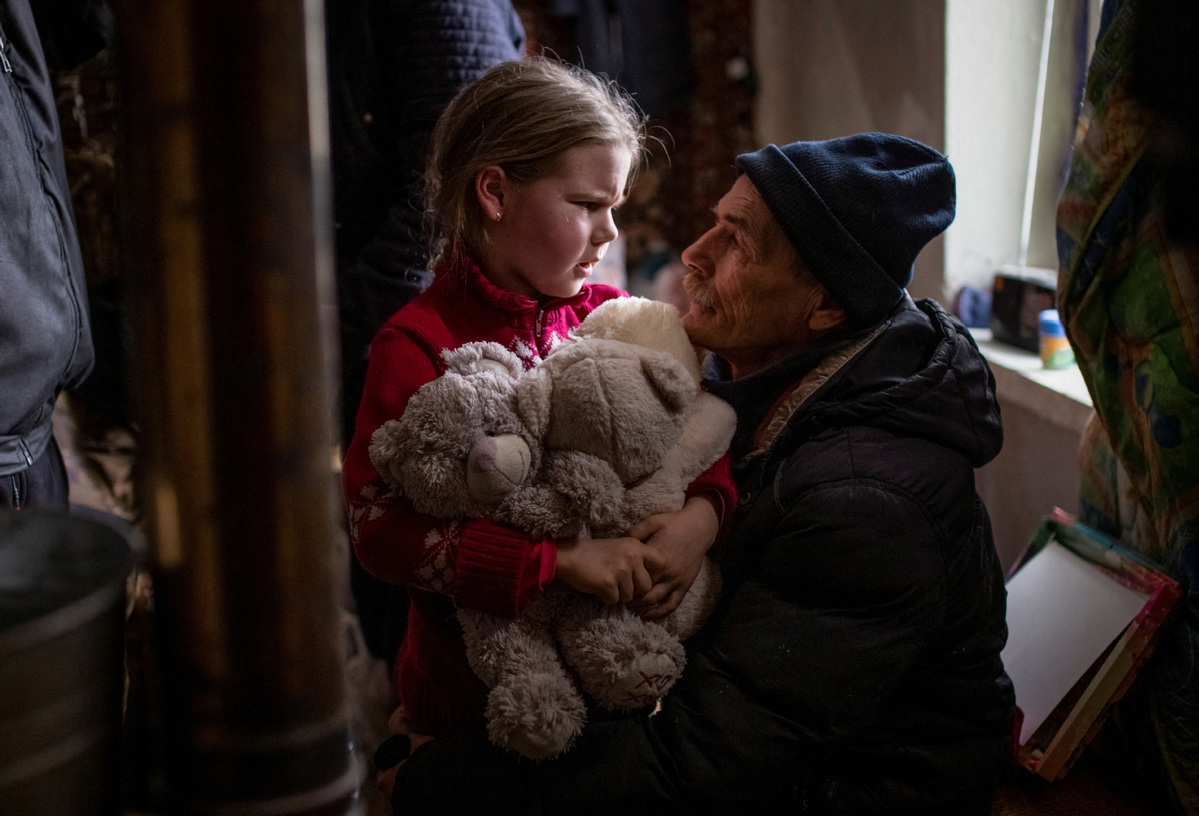
Moscow accused NATO of being "involved in a hybrid war against Russia" on Tuesday, as Western countries pledged to provide more military aid to Kyiv.
Russian Foreign Minister Sergey Lavrov said the "hybrid war" involving NATO has lasted for a long time, and "the war is being refracted in its hot displays, in actions of the Kyiv regime".
Moscow is taking necessary measures to prevent Ukraine from turning into an even sharper threat to Russia's security, he said.
During a news conference after talks with his Egyptian counterpart Sameh Shoukry, he said Russia will prevent the Ukrainian authorities "from prevailing in its policy of discrimination and destruction of rights of all those Ukrainian citizens and former Ukrainian citizens who felt involved in Russian history, Russian culture and Russian traditions".
Russia is watching this process, and the armed forces will take all necessary measures to prevent Western plans from coming to fruition, he said.
Lavrov made his remarks as two United States officials revealed the government is readying more than $2 billion worth of military aid for Ukraine that is expected to include longer-range rockets for the first time, as well as other munitions and weapons.
The aid is expected to be announced as soon as this week, the officials said. It is also expected to include support equipment for Patriot air defense systems, precision-guided munitions and Javelin anti-tank weapons, they were quoted by Reuters as saying.
One of the officials said a portion of the aid, expected to be $1.725 billion, would come from a fund known as the Ukraine Security Assistance Initiative which allows President Joe Biden's administration to get weapons from the industry rather than from US weapons stocks.
Those funds would go toward the purchase of a new weapon, the Ground-Launched Small Diameter Bomb made by Boeing, which has a range of 150 kilometers.
The longer range of the GLSDB glide bomb could allow Ukraine to hit targets that have been out of reach and help it continue pressing its counterattacks by disrupting Russia further behind its lines.
The White House has declined to comment. The nature and size of aid can shift until they are approved by the president.
Mediation role
In an interview with CNN, Israeli Prime Minister Benjamin Netanyahu said on Tuesday he would be willing to consider serving as a mediator between Russia and Ukraine if asked by both countries and the US.
Separately, Ukraine announced it would hold a summit with the European Union in Kyiv this week, as it expressed hope that the conference would bring the nation closer to membership in the bloc.
In an address to the nation, President Volodymyr Zelensky said he hoped the summit on Friday would reflect a high "level of cooperation and progress" with the 27-member bloc, which Kyiv has long sought to join.
However, the Russian state news agency TASS quoted a source from the European delegation to the summit saying EU leaders will not make a pledge to speed up the process of Ukraine's accession to the bloc.
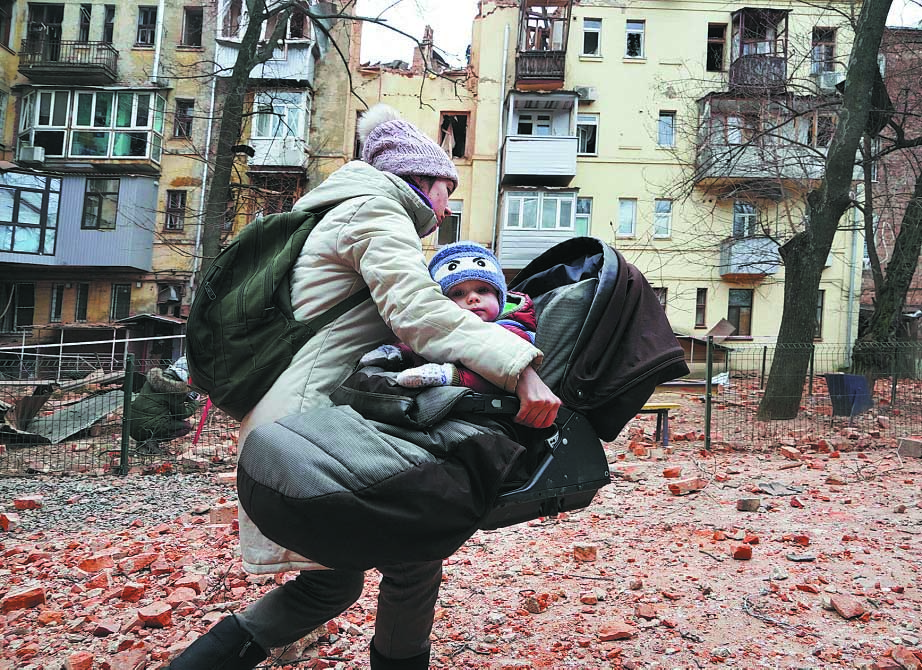
Joe Biden rejects appeal for air support days after okaying the supply of tanks
The United States will not give fighter jets to Ukraine, US President Joe Biden said, after Kyiv urged allies to follow commitments to send battle tanks with pledges to provide planes.
Biden's administration had previously said it would consider the request for Lockheed Martin F-16 fighters.
On Monday, Biden told a reporter he would not send the aircraft for use in the Russia-Ukraine conflict.
His decision followed Germany's Chancellor Olaf Scholz saying on Sunday that he would not send aircraft to Ukraine, over fears it would escalate the conflict.
The BBC said US-made F-16s and German-made Eurofighter Typhoons would have greatly improved upon the Soviet-era MiG jets Ukraine is currently using, which were made before the country declared independence in 1991.
John Kirby, the US' national security council coordinator for strategic communications, told CNN that Washington will continue to support Ukraine, and carry on spending that has totaled $27.1 billion so far.
"There's a lot of capability that is being sent, and will be sent in the coming weeks and months," he said.
Ukraine's President Volodymyr Zelensky had urged allies to send jets, as had Ukraine's Deputy Foreign Minister Andriy Melnyk, who said he hoped to see a "fighter jet coalition" featuring not only donated F-16s and German Eurofighter Typhoons but also Rafales from France and Gripen jets from Sweden.
On Monday, France's President Emmanuel Macon said "by definition, nothing is excluded" in his nation's debate about the military assistance it may provide. But he too said he will commit to nothing that may escalate the conflict and any jets France may send must not be used to "hit Russian soil" but "purely to aid the resistance effort".
Oleksii Reznikov, Ukraine's defense minister, was in Paris on Tuesday to meet his counterpart, Sebastien Lecornu, and Macron, to continue the conversation.
Poland is also understood to be mulling the request for fighter jets, in its case F-16s and MiG-29s, but Prime Minister Mateusz Morawiecki also said he will do nothing to escalate the conflict and act "in complete coordination "with NATO.
The Netherlands has also said it is considering Kyiv's request.
The United Kingdom's defense secretary, Ben Wallace, said on Monday all allies will likely reconsider the provision of jets many times.
"I think what we know about all these demands is that … the initial response is 'no' and it ends up being 'yes'," The Guardian newspaper quoted him on Tuesday as saying.
Russia has said any weaponry sent to Ukraine will only prolong the conflict and lead to more fatalities.
Kremlin spokesperson Dmitry Peskov said on Monday NATO was "more and more becoming directly involved in the conflict", but that the involvement will not significantly change the conflict's course.
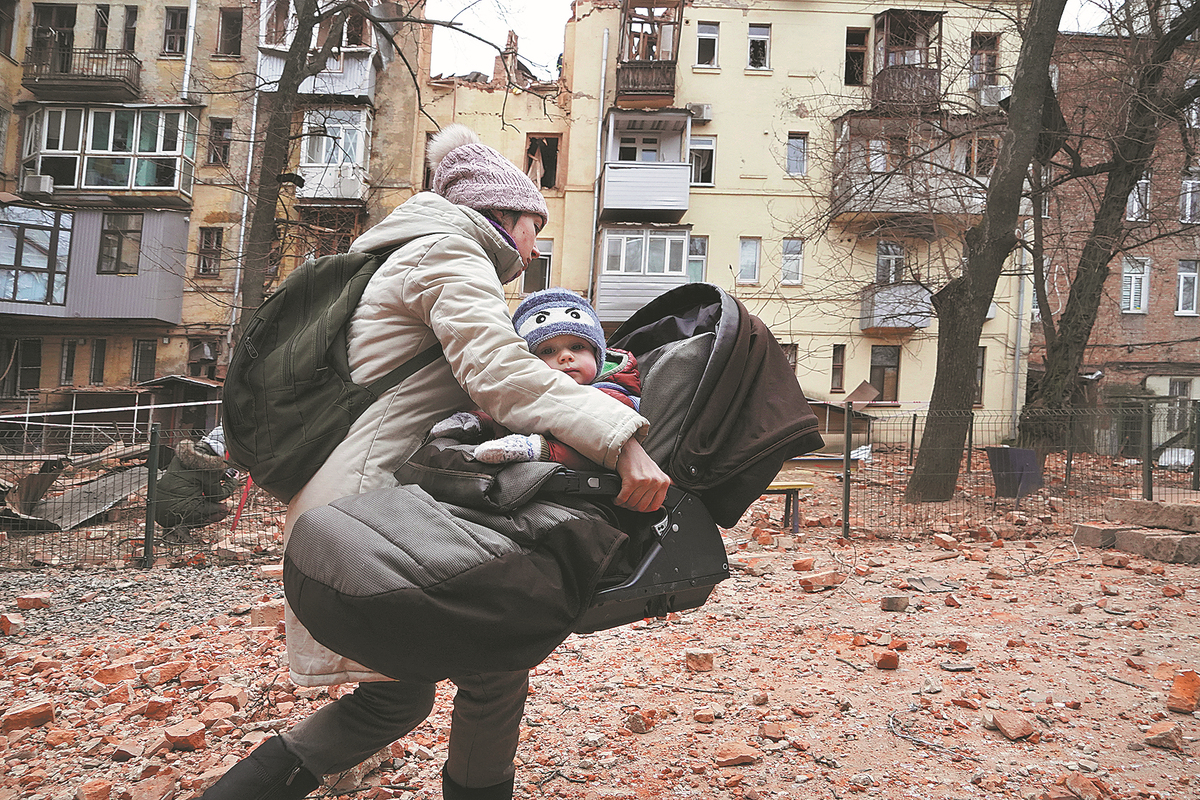
KYIV — The United States will not provide the F-16 fighter jets that Ukraine has sought in its battle against Russia, President Joe Biden said, as Russian forces claimed a series of gains on the battlefield.
Asked if the US would provide the jets, Biden told reporters at the White House on Monday: "No."
Ukraine planned to push for Western fourth-generation fighter jets, such as the F-16, after securing supplies of main battle tanks last week, an adviser to Ukraine's defense minister said on Friday.
"The next big hurdle will now be the fighter jets," Yuriy Sak, who advises Defense Minister Oleksiy Reznikov, told Reuters then.
But France and Poland appear to be willing to entertain any such request from Ukraine, with French President Emmanuel Macron telling reporters in The Hague on Monday that "by definition, nothing is excluded" when it comes to military assistance.
In Poland on Monday, Prime Minister Mateusz Morawiecki also did not rule out a possible supply of F-16s to neighboring Ukraine, in response to a question from a reporter before Biden spoke.
Lithuanian President Gitanas Nauseda said on Monday that NATO should stop drawing "red lines" and should supply Ukraine with whatever weapons it needed, including fighter jets and long-range missiles.
'Aggressive position'
Russia warned on Tuesday that calls by the president of Lithuania to supply Ukraine with fighter jets highlighted the "extremely aggressive position" of the Baltic states and Poland, and that "major European countries" should counterbalance their stance.
Kremlin spokesman Dmitry Peskov told reporters: "In general, we see an extremely aggressive position from representatives of the Baltic countries and Poland. They are apparently ready to do anything to provoke the growth of further confrontation, with little regard for the consequences."
Ukrainian President Volodymyr Zelensky has warned for weeks that Moscow aims to step up its assault after about two months of virtual stalemate along the front line that stretches across the south and east.
Ukraine won a huge boost last week when Germany and the US announced plans to provide heavy tanks, ending weeks of diplomatic deadlock on the issue.
While there was no sign of a broader new Russian offensive, the administrator of Russian-controlled parts of Donetsk, Denis Pushilin, said Russian troops had secured a foothold in Vuhledar, a coal-mining town whose ruins have been a Ukrainian bastion since the outset of the conflict.
Meanwhile, Russian Deputy Foreign Minister Sergei Ryabkov on Monday met with new US Ambassador to Russia Lynne Tracy, who presented copies of her credentials.
During the conversation with Tracy on the sharply worsened Russia-US relations, Ryabkov pointed out the counterproductiveness of Washington's confrontational policy, which is "fraught with serious negative consequences", the Russian Foreign Ministry said in a statement.
Taking office on Jan 9, Tracy is the first woman to occupy the post of US ambassador to Russia.
Xinhua
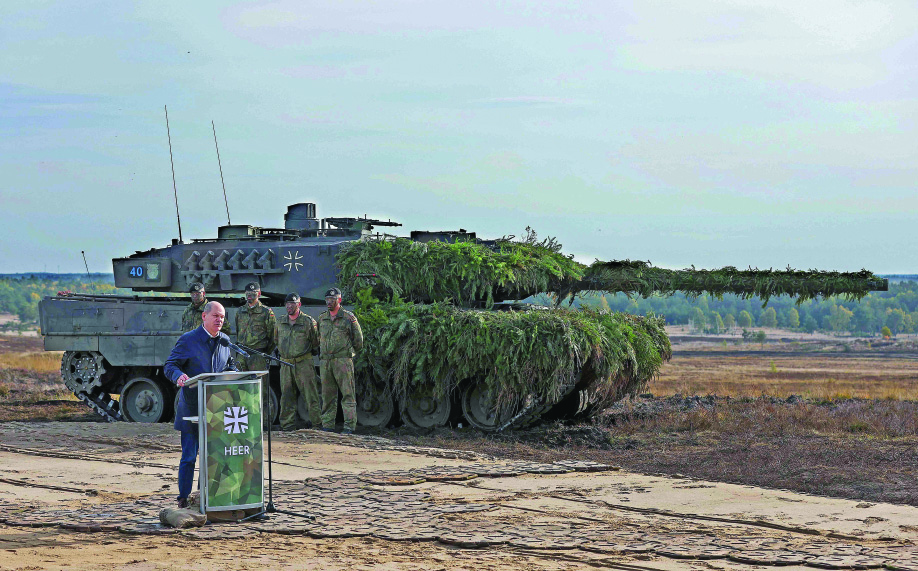
Russia says actions of 'puppet masters' leave no room for talks as arms flow in
MOSCOW/KYIV — Russia has lashed out at Ukraine's Western allies, denouncing them as "puppet masters" amid Ukraine's renewed calls for faster weapons supplies, as fighting rages in the country's east.
With the United States having decided to supply tanks to Ukraine, it makes no sense for Moscow to talk to Kyiv or its Western "puppet masters", Russian state news agency RIA Novosti quoted Deputy Foreign Minister Sergey Ryabkov as saying on Monday.
Ryabkov said no one in the West has come up with any serious initiatives on resolving the Ukrainian crisis.
One day earlier, however, a Kremlin spokesperson told RIA that Russian President Vladimir Putin was open to contacts with German Chancellor Olaf Scholz.
Germany said last week it would send 14 of its Leopard 2 tanks to Kyiv and also approve Leopard shipments by allied European countries. The announcement, followed shortly afterward by a US pledge of M1 Abrams tanks to Kyiv, infuriated the Kremlin.
"For now, there are no agreed talks (with Scholz) in the schedule. Putin has been and remains open to contacts," Kremlin spokesman Dmitry Peskov was quoted as saying by the news agency on Sunday.
Scholz was quoted by the Berlin daily Tagesspiegel in an interview published on Sunday as saying: "I will also speak to Putin again — because it is necessary to speak."
Scholz reiterated that Germany will not send fighter jets to Ukraine.
"I can only advise against entering into a constant bidding war when it comes to weapons systems," Scholz said.
"If, as soon as a decision (on tanks) has been made, the next debate starts in Germany, that doesn't come across as serious and undermines citizens' confidence in government decisions."
He is currently on a visit to South America.
Putin and Scholz last spoke by phone in early December. The Russian leader said at the time the German and Western line on Ukraine was "destructive" and called on Berlin to rethink its approach.
Germany is the second-largest donor of military hardware to Ukraine after the US, according to the Kiel Institute for the World Economy, ahead of other European powers such as France and Britain.
Kyiv says peace talks are possible only if Russia stops attacking and withdraws all forces from Ukrainian soil.
NATO Secretary-General Jens Stoltenberg visited the Republic of Korea, a US ally and major arms exporter, on Monday and urged Seoul to increase military support to Ukraine.
And in the north, the Democratic People's Republic of Korea on Sunday denied providing arms to Moscow.
In a statement by the official Korean Central News Agency, a senior official rejected the accusations from Washington, warning that the US would face a "really undesirable result" if it persisted in spreading the "self-made rumor".
In developments on the battlefield, Russian missile strikes killed three people in the city of Kherson while fighting raged in the eastern Donetsk region, Ukrainian officials said.
'Tough situation'
Zelensky said Ukraine was facing a difficult situation in Donetsk and needed faster weapons supplies and new types of weaponry, just days after allies agreed to provide Kyiv with heavy battle tanks.
"The situation is very tough. Bakhmut, Vuhledar and other sectors in Donetsk region, there are constant Russian attacks," Zelensky said in a video address on Sunday.
"We have to make time for our weapon. We have to speed up events, speed up supplies and open up new weapons options for Ukraine."
Three people were killed and six injured on Sunday by strikes on Kherson that damaged a hospital and a school, the regional administration said. The Kremlin hasn't responded to the shelling.
Russia on Saturday accused the Ukrainian military of deliberately striking a hospital, killing 14 people.
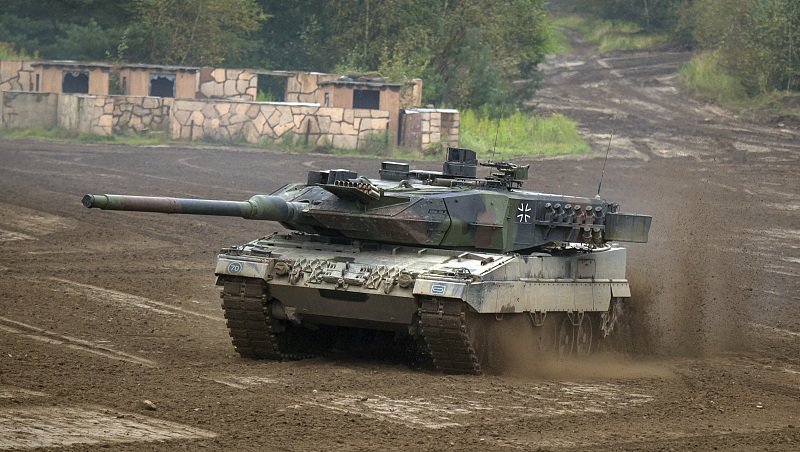
OTTAWA - Canadian Defence Minister Anita Anand is set to announce Thursday that Canada will be sending four battle tanks to Ukraine, CTV News reported.
In addition to the initial four Leopard 2 tanks, Canada is considering sending more tanks at a later date, the report said, quoting government sources.
The Canadian Armed Forces currently has 82 German-made Leopard 2 battle tanks, but they are in various states of serviceability, according to the report.
On Wednesday, Germany and the United States announced they would be organizing the shipment of dozens of Leopard 2 tanks to Ukraine.
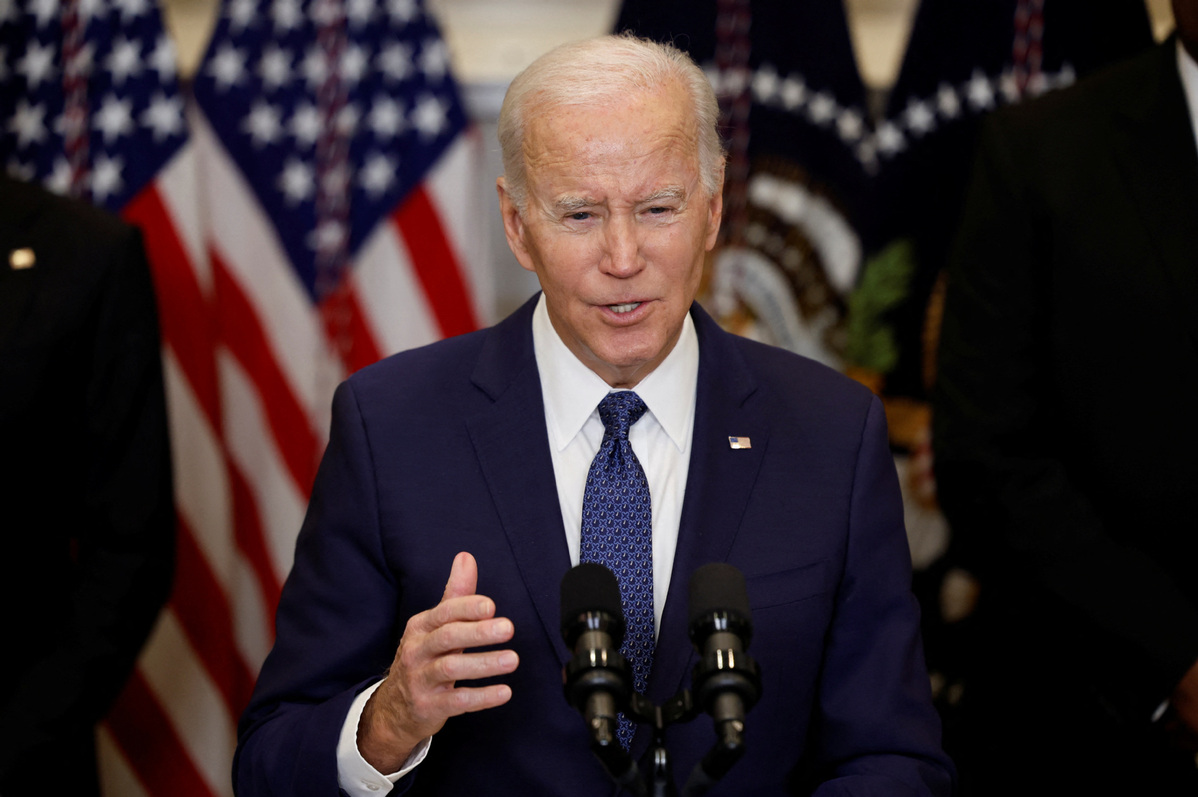
WASHINGTON - US President Joe Biden announced Wednesday that his administration will provide Ukraine with 31 US-made M1 Abrams tanks, which Russia has said will be its target if they were to be used in the ongoing conflict between Moscow and Kyiv.
"Today I'm announcing that the United States will be sending 31 Abrams tanks to Ukraine, the equivalent of one Ukrainian battalion," Biden said, addressing the nation in televised remarks from the White House.
Biden said the decision was recommended by Defense Secretary Lloyd Austin, who, together with Secretary of State Antony Blinken, flanked Biden as he spoke. "Because it'll enhance Ukraine's capacity to defend its territory and achieve the strategic objectives," Biden said.
Biden said the United States is also sending Ukraine parts and equipment necessary to sustain the sophisticated tanks, adding that Washington will soon begin to train Ukrainian soldiers on how to operate and maintain the tanks, the delivery of which, he noted, will take time.
The US delivery of M1 Abrams tanks, among the most powerful and capable of the kind in the world, is considered yet another major development in the Ukraine crisis, potentially further escalating the situation as other members of the North Atlantic Treaty Organization (NATO) also intended to aid Ukraine with tanks.
Before the formal announcement by Biden, reports of US provision of the M1 Abrams tanks to Ukraine had already infuriated Russia.
Moscow's ambassador in Washington, Anatoly Antonov, said Tuesday that "if a decision to transfer to Kyiv M1 Abrams is made, American tanks without any doubt will be destroyed as all other samples of NATO military equipment."
"If the United States decides to supply tanks, it will be impossible to justify such step using arguments about 'defensive weapons,'" the envoy said. "This would be another blatant provocation against the Russian Federation."
The US commitment came on the heel of the confirmation from Germany that it will deliver 14 Leopard 2 A6 tanks to Ukraine, ending a stalemate where a previously reluctant Germany found itself under increasing pressure from the United States and other allies to authorize tank shipment to Ukraine, which has long demanded such weapons.
Other NATO countries, including Poland, the Netherlands, Norway and Spain, have either committed to or been considering sending Ukraine the Leopard 2 tanks. Britain has already said it will send its Challenger 2 tanks to aid Ukraine's offensive in the conflict with Russia.
Biden said in his remarks that earlier in the day, he spoke with German Chancellor Olaf Scholz, French President Emmanuel Macron, British Prime Minister Rishi Sunak and Italian Prime Minister Giorgia Meloni "as part of our close coordination on support for Ukraine."
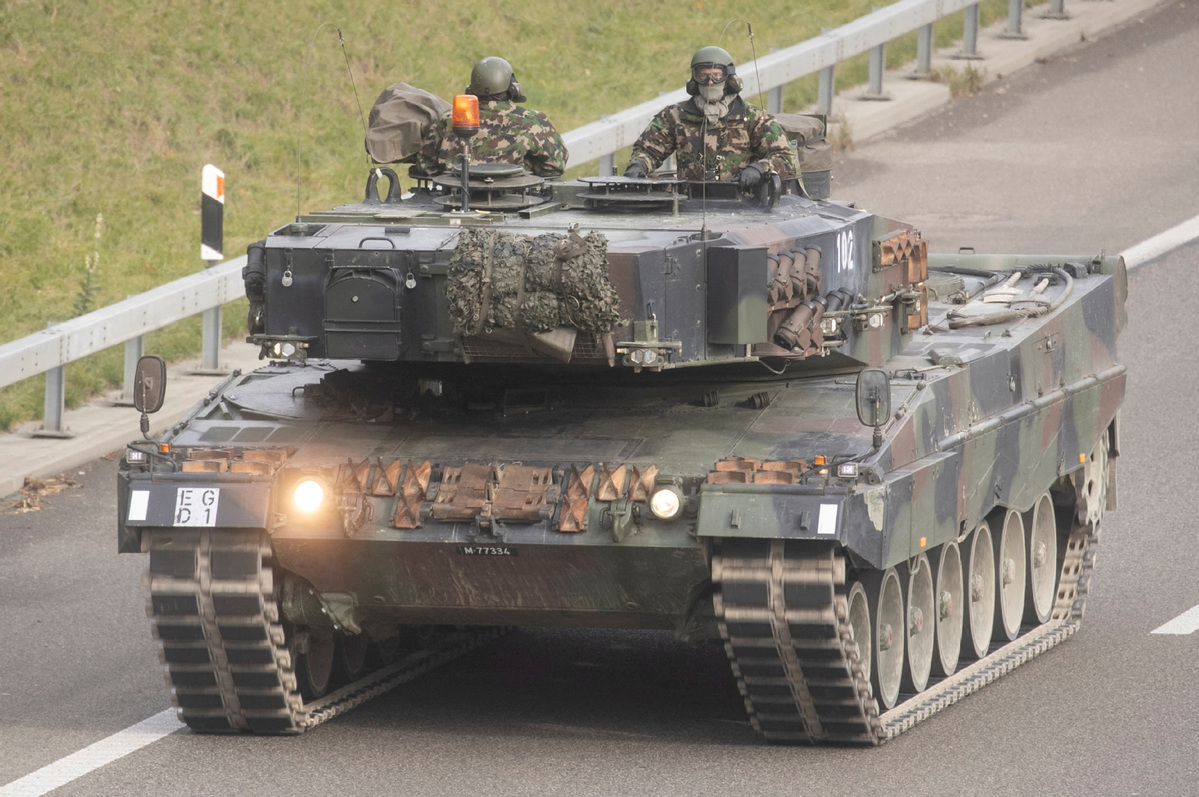
BERLIN - The German government has decided to provide Ukraine with 14 Leopard 2A6 battle tanks from its own Bundeswehr stocks. The aim is to "quickly assemble" two tank battalions with additional units coming from European partners, the government said on Wednesday.
"This decision follows our well-known line of supporting Ukraine to the best of our ability," Chancellor Olaf Scholz said at a government meeting in Berlin. "We are acting in a closely coordinated manner internationally."
Other members of the North Atlantic Treaty Organization (NATO) have recently put pressure on Germany to supply battle tanks to Ukraine. On Tuesday, Poland was the first country to officially request Berlin's approval to send tanks from its own stock.
As Germany will now supply Leopard tanks to Ukraine, NATO partners were also given the go-ahead to do so. Ukrainian crews are also to be provided with training on the Leopard tanks as well as logistics, ammunition and maintenance for the systems, the government said.
Shipments of Leopard tanks to Ukraine would "not bode well" for Russian-German relations and will "undoubtedly leave an unavoidable mark for the future of these relations," Kremlin Spokesman Dmitry Peskov told Russian news agency TASS on Tuesday.
Last Friday, Germany's Minister of Defense Boris Pistorius postponed the decision and instead announced further deliveries of Marder infantry fighting vehicles, Gepard anti-aircraft tanks and a Patriot surface-to-air missile system to Ukraine.
Germany's military support for Ukraine totals 3.3 billion euros ($3.6 billion), the country's Defense Ministry said last week.

MOSCOW - Russian Foreign Minister Sergei Lavrov said Wednesday that the Ukraine crisis is "the result of preparations by the United States and its satellites for the start of a global hybrid war" against his country.
The West is trying to prove that they are not fighting Russia but are only helping Ukraine respond to an "aggression" and restore its territorial integrity, Lavrov said at his annual press conference, adding that the scale of their support makes it clear that the West has staked a great deal on its war against Russia.
As for the prospects for negotiations between Russia and the West on the Ukraine issue, Lavrov said that Russia is ready to consider serious proposals, but there haven't been any so far.
